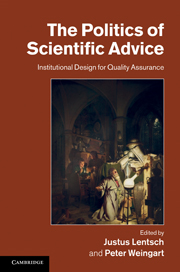Book contents
- Frontmatter
- Contents
- List of figures
- List of tables
- Acknowledgements
- Biographical notes
- Part I Methodological issues: quality control and assurance in scientific policy advice
- Part II Collegial science advisory bodies
- Part III Collegial science policy advisory bodies
- Part IV Research-based advisory organisations
- Part V Academies of science
- 17 Scientific advice for policy in the United States: lessons from the National Academies and the Former Congressional Office of Technology Assessment
- 18 Quality control in scientific policy advice: the experience of the Royal Society
- 19 European Academies Science Advisory Council (EASAC)
- 20 Quality control in the advisory process: towards an institutional design for robust science advice
- Index
- References
17 - Scientific advice for policy in the United States: lessons from the National Academies and the Former Congressional Office of Technology Assessment
Published online by Cambridge University Press: 25 October 2011
- Frontmatter
- Contents
- List of figures
- List of tables
- Acknowledgements
- Biographical notes
- Part I Methodological issues: quality control and assurance in scientific policy advice
- Part II Collegial science advisory bodies
- Part III Collegial science policy advisory bodies
- Part IV Research-based advisory organisations
- Part V Academies of science
- 17 Scientific advice for policy in the United States: lessons from the National Academies and the Former Congressional Office of Technology Assessment
- 18 Quality control in scientific policy advice: the experience of the Royal Society
- 19 European Academies Science Advisory Council (EASAC)
- 20 Quality control in the advisory process: towards an institutional design for robust science advice
- Index
- References
Summary
Introduction
The pace of science and technology advancement over the past half-century has delivered enormous benefits to societies throughout the world as well as sobering challenges associated with the role of technology in virtually every aspect of our lives. While reaping the benefits, all of society must also cope with the challenges.
Over two centuries ago as the American democracy took shape, the founding fathers of the fledgling republic worried that democracy could flourish only when the electorate and, in particular, the institutions of government serving it are well informed about the issues upon which they must decide. Today, and increasingly, as science and technology issues become more and more prevalent, prominent, complex and of far reaching impact on society, a democratic government poorly informed about such issues carries greater and greater risk in making bad policy choices with potentially significant consequences from such choices. Yet, it is also becoming increasingly more difficult for anyone, or even any one institution, to keep pace with the frontier of scientific knowledge and its impact on society. In addition, over the last quarter century, the information revolution has expanded the quantity of information accessible to government policymakers, but more information has not proved to be necessarily better information. Indeed, a fundamental problem today is not the lack of information; rather, it is how to gauge validity and usefulness within the torrent of available information and advice.
- Type
- Chapter
- Information
- The Politics of Scientific AdviceInstitutional Design for Quality Assurance, pp. 297 - 333Publisher: Cambridge University PressPrint publication year: 2011
References
- 3
- Cited by



